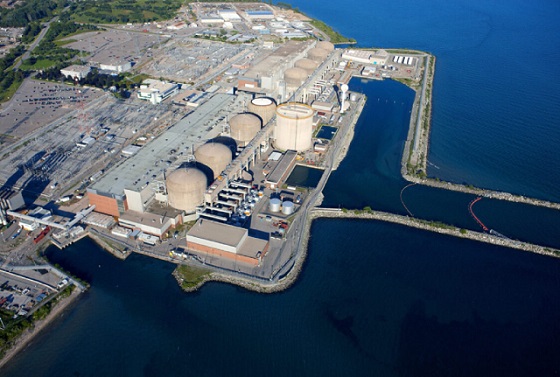Energy
Ontario Plans Major Nuclear Refurbishment to Meet Growing Electricity Demand

Pickering Nuclear Generating Station
From EnergyNow.ca
Ontario Power Generation planning to extend life of aging Pickering Nuclear Generating Station by decades
Ontario Power Generation is moving ahead with a plan to extend the life of the aging Pickering Nuclear Generating Station by decades, as the province tries to secure more electricity supply in the face of increasing demand.
Nuclear big player in getting to Net Zero
“Our province still needs this station and its workers,” he said at a press conference outside the nuclear plant. The construction phase will create about 11,000 jobs, he said, and provide about 6,000 jobs for decades.
OPG plans to spend $2 billion on engineering and design work and securing key components for the project that is expected to be completed in the mid-2030s.
Neither Smith nor OPG officials would give an estimate for how much the entire refurbishment will cost.
“It would be irresponsible at this point in time to put a number out there, because it’s this essential design and scoping and engineering work that is going to get us to the place where we can have a number,” Smith said.
OPG said a refurbishment at its Darlington Nuclear Generating Station is costing $12.8 billion and is on time and on budget.
Ken Hartwick, chief executive of OPG, said the Darlington refurbishment as well as one at Bruce Power will help guide the Pickering life extension.
“We have learned a lot about what it takes to refurbish a nuclear station the right way with thousands of lessons learned from Darlington and Bruce Power that we will apply to Pickering,” Hartwick said.
The four units produce about 2,000 megawatts of electricity, enough to power two million homes.
The Independent Electricity System Operator has said Ontario’s electricity demand is expected to grow by about two per cent each year, but could be even higher. A promise to build 1.5 million homes by 2031 and several large-scale manufacturing investments such as electric vehicle battery plants are helping to push demand higher.
The province needs more supply particularly starting in the mid-2030s, the IESO has said.
Keith Stewart, a senior energy strategist with Greenpeace Canada, said the price of wind and solar power with battery storage has “dropped like a stone” and should be more central to Ontario’s energy policy.
“Any credible independent cost-benefit analysis would find that we should be investing in the renewable-powered energy system of the future, rather than pouring billions more into rebuilding nuclear reactors long past their best-before date,” he wrote in a statement.
Pickering produces about 14 per cent of the province’s electricity but its current licence to operate the four units in question expires at the end of this year. OPG has asked the Canadian Nuclear Safety Commission to extend that to 2026, but a public hearing for that application has not yet been scheduled.
Green Party Leader Mike Schreiner said Greens understand that nuclear power will continue to be part of the energy mix for decades, but the province also needs much more wind and solar power and no more natural gas generation.
“Instead of attracting jobs and investment in low-cost renewables, the Ford government is making Ontario’s grid dirtier and more expensive by prioritizing dirty fossil gas plants and the costly, poor-performing Pickering plant,” he wrote in a statement.
The IESO announced last month that it is looking to add 2,000 megawatts of non-emitting electricity generation online such as wind, solar, bioenergy and hydro to the system. However, it also says natural gas is still required to ensure supply and stability in the short to medium term, though it will also increase greenhouse-gas emissions from the electricity sector.
Ontario’s electricity system was 94 per cent emissions free in 2020, but today that figure has fallen to 90 per cent.
The nuclear safety commission would still have to approve the Pickering refurbishment.
Two other units at Pickering are also set to stop operating at the end of this year. They are part of what’s known as the A units, which came online in the 1970s and were removed from service in 1997. Two of the units were refurbished and began operating again in 2003 and 2005.
Alberta
Is Canada’s Federation Fair?


 David Clinton
David Clinton
Contrasting the principle of equalization with the execution
Quebec – as an example – happens to be sitting on its own significant untapped oil and gas reserves. Those potential opportunities include the Utica Shale formation, the Anticosti Island basin, and the Gaspé Peninsula (along with some offshore potential in the Gulf of St. Lawrence).
So Quebec is effectively being paid billions of dollars a year to not exploit their natural resources. That places their ostensibly principled stand against energy resource exploitation in a very different light.
You’ll need to search long and hard to find a Canadian unwilling to help those less fortunate. And, so long as we identify as members of one nation¹, that feeling stretches from coast to coast.
So the basic principle of Canada’s equalization payments – where poorer provinces receive billions of dollars in special federal payments – is easy to understand. But as you can imagine, it’s not easy to apply the principle in a way that’s fair, and the current methodology has arguably lead to a very strange set of incentives.
According to Department of Finance Canada, eligibility for payments is determined based on your province’s fiscal capacity. Fiscal capacity is a measure of the taxes (income, business, property, and consumption) that a province could raise (based on national average rates) along with revenues from natural resources. The idea, I suppose, is that you’re creating a realistic proxy for a province’s higher personal earnings and consumption and, with greater natural resources revenues, a reduced need to increase income tax rates.
But the devil is in the details, and I think there are some questions worth asking:
- Whichever way you measure fiscal capacity there’ll be both winners and losers, so who gets to decide?
- Should a province that effectively funds more than its “share” get proportionately greater representation for national policy² – or at least not see its policy preferences consistently overruled by its beneficiary provinces?
The problem, of course, is that the decisions that defined equalization were – because of long-standing political conditions – dominated by the region that ended up receiving the most. Had the formula been the best one possible, there would have been little room to complain. But was it?
For example, attaching so much weight to natural resource revenues is just one of many possible approaches – and far from the most obvious. Consider how the profits from natural resources already mostly show up in higher income and corporate tax revenues (including income tax paid by provincial government workers employed by energy-related ministries)?
And who said that such calculations had to be population-based, which clearly benefits Quebec (nine million residents vs around $5 billion in resource income) over Newfoundland (545,000 people vs $1.6 billion) or Alberta (4.2 million people vs $19 billion). While Alberta’s average market income is 20 percent or so higher than Quebec’s, Quebec’s is quite a bit higher than Newfoundland’s. So why should Newfoundland receive only minimal equalization payments?
To illustrate all that, here’s the most recent payment breakdown when measured per-capita:
 |
For clarification, the latest per-capita payments to poorer provinces ranged from $3,936 to PEI, $1,553 to Quebec, and $36 to Ontario. Only Saskatchewan, Alberta, and BC received nothing.
And here’s how the total equalization payments (in millions of dollars) have played out over the past decade:
Is energy wealth the right differentiating factor because it’s there through simple dumb luck, morally compelling the fortunate provinces to share their fortune? That would be a really difficult argument to make. For one thing because Quebec – as an example – happens to be sitting on its own significant untapped oil and gas reserves. Those potential opportunities include the Utica Shale formation, the Anticosti Island basin, and the Gaspé Peninsula (along with some offshore potential in the Gulf of St. Lawrence).
So Quebec is effectively being paid billions of dollars a year to not exploit their natural resources. That places their ostensibly principled stand against energy resource exploitation in a very different light. Perhaps that stand is correct or perhaps it isn’t. But it’s a stand they probably couldn’t have afforded to take had the equalization calculation been different.
Of course, no formula could possibly please everyone, but punishing the losers with ongoing attacks on the very source of their contributions is guaranteed to inspire resentment. And that could lead to very dark places.
Note: I know this post sounds like it came from a grumpy Albertan. But I assure you that I’ve never even visited the province, instead spending most of my life in Ontario.
Which has admittedly been challenging since the former primer minister infamously described us as a post-national state without an identity.
Subscribe to The Audit.
For the full experience, upgrade your subscription.
Banks
Wall Street Clings To Green Coercion As Trump Unleashes American Energy


From the Daily Caller News Foundation
By Jason Isaac
The Trump administration’s recent move to revoke Biden-era restrictions on energy development in Alaska’s North Slope—especially in the Arctic National Wildlife Refuge (ANWR)—is a long-overdue correction that prioritizes American prosperity and energy security. This regulatory reset rightly acknowledges what Alaska’s Native communities have long known: responsible energy development offers a path to economic empowerment and self-determination.
But while Washington’s red tape may be unraveling, a more insidious blockade remains firmly in place: Wall Street.
Despite the Trump administration’s restoration of rational permitting processes, major banks and insurance companies continue to collude in starving projects of the capital and risk management services they need. The left’s “debanking” strategy—originally a tactic to pressure gun makers and disfavored industries—is now being weaponized against American energy companies operating in ANWR and similar regions.
Dear Readers:
As a nonprofit, we are dependent on the generosity of our readers.
Please consider making a small donation of any amount here. Thank you!
This quiet embargo began years ago, when JPMorgan Chase, America’s largest bank, declared in 2020 that it would no longer fund oil and gas development in the Arctic, including ANWR. Others quickly followed: Goldman Sachs, Wells Fargo, and Citigroup now all reject Arctic energy projects—effectively shutting down access to capital for an entire region.
Insurers have joined the pile-on. Swiss Re, AIG, and AXIS Capital all publicly stated they would no longer insure drilling in ANWR. In 2023, Chubb became the first U.S.-based insurer to formalize its Arctic ban.
These policies are not merely misguided—they are dangerous. They hand America’s energy future over to OPEC, China, and hostile regimes. They reduce competition, drive up prices, and kneecap the very domestic production that once made the U.S. energy independent.
This isn’t just a theoretical concern. I’ve experienced this discrimination firsthand.
In February 2025, The Hartford notified the American Energy Institute—an educational nonprofit I lead—that it would not renew our insurance policy. The reason? Not risk. Not claims. Not underwriting. The Hartford cited our Facebook page.
“The reason for nonrenewal is we have learned from your Facebook page that your operations include Trade association involved in promoting social/political causes related to energy production. This is not an acceptable exposure under The Hartford’s Small Commercial business segment’s guidelines.”
That’s a direct quote from their nonrenewal notice.
Let’s be clear: The Hartford didn’t drop us for anything we did—they dropped us for what we believe. Our unacceptable “exposure” is telling the truth about the importance of affordable and reliable energy to modern life, and standing up to ESG orthodoxy. We are being punished not for risk, but for advocacy.
This is financial discrimination, pure and simple. What we’re seeing is the private-sector enforcement of political ideology through the strategic denial of access to financial services. It’s ESG—Environmental, Social, and Governance—gone full Orwell.
Banks, insurers, and asset managers may claim these decisions are about “climate risk,” but they rarely apply the same scrutiny to regimes like Venezuela or China, where environmental and human rights abuses are rampant. The issue is not risk. The issue is control.
By shutting out projects in ANWR, Wall Street ensures that even if federal regulators step back, their ESG-aligned agenda still moves forward—through corporate pressure, shareholder resolutions, and selective financial access. This is how ideology replaces democracy.
While the Trump administration deserves praise for removing federal barriers, the fight for energy freedom continues. Policymakers must hold financial institutions accountable for ideological discrimination and protect access to banking and insurance services for all lawful businesses.
Texas has already taken steps by divesting from anti-energy financial firms. Other states should follow, enforcing anti-discrimination laws and leveraging state contracts to ensure fair treatment.
But public pressure matters too. Americans need to know what’s happening behind the curtain of ESG. The green financial complex is not just virtue-signaling—it’s a form of economic coercion designed to override public policy and undermine U.S. sovereignty.
The regulatory shackles may be coming off, but the private-sector blockade remains. As long as banks and insurers collude to deny access to capital and risk protection for projects in ANWR and beyond, America’s energy independence will remain under threat.
We need to call out this hypocrisy. We need to expose it. And we need to fight it—before we lose not just our energy freedom, but our economic prosperity.
The Honorable Jason Isaac is the Founder and CEO of the American Energy Institute. He previously served four terms in the Texas House of Representatives.
-

 2025 Federal Election1 day ago
2025 Federal Election1 day agoPoilievre To Create ‘Canada First’ National Energy Corridor
-

 International2 days ago
International2 days agoFREE MARINE LE PEN!’: Trump defends French populist against ‘lawfare’ charges
-

 Automotive2 days ago
Automotive2 days agoDark Web Tesla Doxxers Used Widely-Popular Parking App Data To Find Targets, Analysis Shows
-

 COVID-191 day ago
COVID-191 day agoMaxime Bernier slams Freedom Convoy leaders’ guilty verdict, calls Canada’s justice system ‘corrupt’
-

 Business2 days ago
Business2 days agoWill Trump’s ‘Liberation Day’ Tariffs End In Disaster Or Prosperity?
-

 Censorship Industrial Complex1 day ago
Censorship Industrial Complex1 day agoChina announces “improvements” to social credit system
-

 Carbon Tax1 day ago
Carbon Tax1 day agoThe book the carbon taxers don’t want you to read
-

 International1 day ago
International1 day agoGermany launches first permanent foreign troop deployment since WW2








